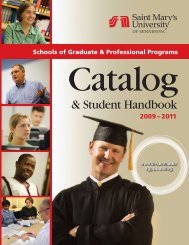PDF version - Saint Mary's University of Minnesota
PDF version - Saint Mary's University of Minnesota
PDF version - Saint Mary's University of Minnesota
You also want an ePaper? Increase the reach of your titles
YUMPU automatically turns print PDFs into web optimized ePapers that Google loves.
English<br />
E340-345 Special Topics in English 1-4 credits<br />
Designed to permit instruction in specialized fields <strong>of</strong> English, explore new topics and utilize the<br />
expertise <strong>of</strong> the faculty and other resource persons.<br />
E351 British Modernism: Its Origin and Its Ends 3 credits<br />
This course explores the primary characteristics <strong>of</strong> British Modernism by studying authors writing<br />
before, during and after the high point <strong>of</strong> the movement in the early twentieth century. By studying<br />
Victorian, Modern and Postmodern British writers, the course considers the creation <strong>of</strong> modernism and<br />
its aesthetic aftermath and simultaneously questions the legitimacy <strong>of</strong> modernism as a distinct aesthetic<br />
category. Special attention is given to aesthetic, theological and philosophical questions and how these<br />
are reflected or addressed in literary works. Authors studied might include Charles Dickens, George<br />
Eliot, Thomas Hardy, Virginia Woolf, Katherine Mansfield, Jean Rhys and Peter Carey. Offered in alternate<br />
spring semesters. Prerequisite: E250.<br />
E352 The Edge <strong>of</strong> Empire 3 credits<br />
This course studies British Literature from the Victorian Age into the postmodern period by looking at<br />
it from the “outside.” By studying works <strong>of</strong> literature from those writing on or about the periphery <strong>of</strong> the<br />
central literary tradition <strong>of</strong> the British empire, students gain a sense <strong>of</strong> post-1830 British literature and<br />
its relationship to the cultural conditions in which it was produced. Topics could include such areas as<br />
Colonial Literature, the Irish Literary Renaissance, and Women’s Literature and consider writers such as<br />
Bram Stoker, Rudyard Kipling, Joseph Conrad, Katherine Mansfield, James Joyce, Graham Greene, Jean<br />
Rhys, Salman Rushdie, and Seamus Heaney. Offered in alternate spring semesters. Prerequisite: E250.<br />
E370 Literature in Evolution 3 credits<br />
This course examines contemporary literature in English by writers from around the world. The course<br />
aims to convey a sense <strong>of</strong> the stylistic and thematic tendencies that continue to evolve in the literatures<br />
<strong>of</strong> our world by exposing students to intensive study <strong>of</strong> the representation <strong>of</strong> a particular theme or<br />
strain (e.g., imperialism, desire) in works by authors from a variety <strong>of</strong> backgrounds and social/political<br />
situations. Offered in alternate spring semesters. Prerequisite: E250.<br />
E373 Postcolonial Fictions 3 credits<br />
This course focuses on literature in English that addresses colonization and decolonization. The course<br />
considers how postcolonial texts present the legacy <strong>of</strong> imperialism; how postcolonial writers inscribe<br />
their perspectives, politics, and lived experiences in literature; and how various fictional accounts<br />
(<strong>of</strong> origin, <strong>of</strong> colonization, <strong>of</strong> identity, <strong>of</strong> nationality) contribute to a contemporary understanding <strong>of</strong><br />
community, history, and narrative. Offered in alternate spring semesters. Prerequisite: E250.<br />
E381 The Adventures <strong>of</strong> the Writer in World Literature 3 credits<br />
A study <strong>of</strong> selected works in translation from non-Anglo-American cultural traditions. Students in this<br />
course examine how geographical and cultural differences contribute to varying literary representations<br />
<strong>of</strong> “universal” themes. Taking as our point <strong>of</strong> departure the notion <strong>of</strong> the artist figure, we examine<br />
ancient and modern ideas <strong>of</strong> creativity, authorship, and the role <strong>of</strong> the writer in society in cultures<br />
around the world. Offered in alternate fall semesters. Prerequisite: E250.<br />
E383 Geographies <strong>of</strong> Identity 3 credits<br />
A study <strong>of</strong> selected works in translation from non-Anglo-American cultural traditions. Students in this<br />
course explore literature from around the world with a focus on how identities, perspectives, and values<br />
are shaped by geographical and cultural circumstances. We look particularly at literary dialogues and<br />
confrontations between the Western European tradition and writers from other cultures, especially Russian<br />
and African, from the 19th century to today. Offered in alternate fall semesters. Prerequisite: E250.<br />
107 107
















